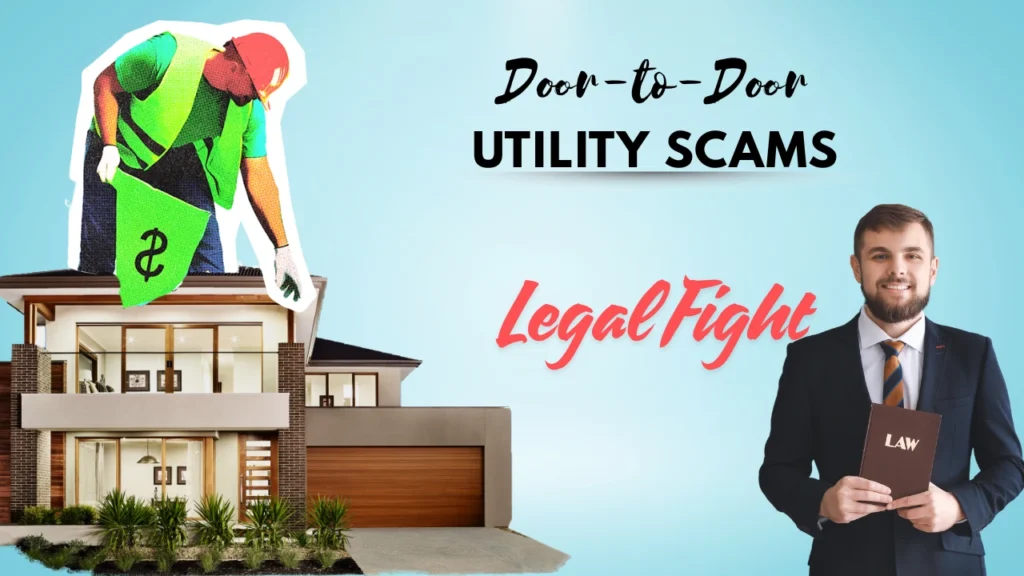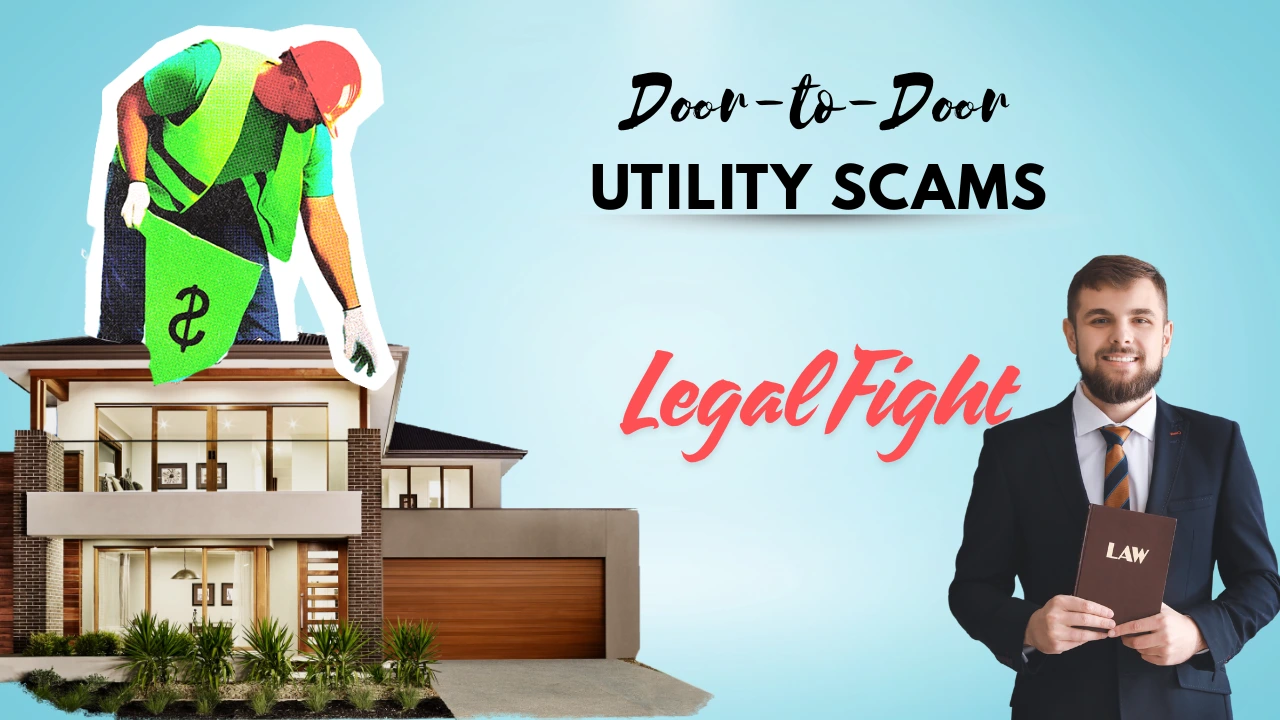How to Legally Fight Back Against Door-to-Door Utility Scams.Door-to-door scams are like wolves dressed in fleece. They knock at your door, wearing the disguise of “official utility representatives,” aiming to prey on trust. From inflated electricity offers to fake water line inspections, these schemes cost households millions annually.
Yet, most people don’t know that legal shields already exist to protect them. This blog dissects the tactics of these con artists, shows you how to fight back within the law, and empowers you to guard both your wallet and your peace of mind.
How to Legally Fight Back Against Door-to-Door Utility Scams-Overview
| Article on | How to Legally Fight Back Against Door-to-Door Utility Scams |
| Ask for proper ID | Forces scammers to retreat, as impersonation is illegal. |
| Refuse immediate contracts | Protects you from binding fraudulent agreements. |
| Call the utility company | Confirms legitimacy instantly. |
| Report to state attorney general | Starts an investigation against fraudsters. |
| File a police report if harassed | Creates a record for stronger legal action. |
Recognizing the Anatomy of a Utility Scam
Scammers excel at theater. They wear hard hats, carry clipboards, and sometimes even mimic logos from real companies. Their script usually includes:

- Urgency: “Your service will be disconnected unless you act now.”
- Authority mimicry: Fake badges, technical jargon, or company-branded shirts.
- Confusion tactics: Overwhelming you with numbers and “discount offers.”
Why Legal Knowledge is Your Best Defense
The beauty of law is that it transforms ordinary people into formidable defenders. By understanding your rights, you can resist pressure, hold impostors accountable, and even initiate action against them. Ignorance fuels scams; awareness extinguishes them.
Federal and State Protections
1. Federal Trade Commission (FTC)
The FTC enforces laws against deceptive practices. If you’ve been tricked into signing a false contract, you may have grounds for cancellation under the Cooling-Off Rule — giving you three business days to withdraw.
2. State Utility Commissions
Most states regulate electricity, gas, and water services. Reporting scams to them can not only protect you but also trigger fines against fraudulent operators.
3. Consumer Protection Acts
Many states have versions of “Unfair and Deceptive Acts and Practices” (UDAP) laws, allowing you to sue for damages if you’ve been financially injured.
Key Laws and Where They Protect You
Here is a table breaking down the most relevant laws:
| Law/Rule | Coverage | Practical Benefit |
| FTC Cooling-Off Rule | Federal | Cancel contracts signed under pressure within 3 days. |
| UDAP Laws | State | Sue scammers for deceptive sales tactics. |
| State Utility Commission Regulations | State | Utility companies must verify reps; impersonators face penalties. |
| Telemarketing Sales Rule (TSR) | Federal | Prohibits misrepresentation of utility savings. |
Practical Moves to Outwit Scammers Legally
- Document Everything
Write down names, badge numbers, contract copies, and even license plates. Documentation is ammunition in court. - Invoke Your Right to Silence
You are never legally bound to answer their questions or let them in. A polite but firm “No, thank you” is enough. - Use Your Local Police
Even if no money is lost, reporting suspicious canvassing helps authorities spot patterns. - Send a Legal Notice (if tricked)
If you signed something under deceit, send a certified letter revoking consent. This protects you if they attempt to enforce the contract later.
Documentation Checklist
Keeping a record strengthens your legal ground. Here’s what to note down:
| Item | Why Keep It |
| Business card or flyer | Proof of solicitation. |
| Contract copy | Helps you rescind or dispute terms. |
| Photos of ID/uniform | Evidence for impersonation. |
| Date & time of visit | Establishes a timeline for reporting. |
| Witness details (neighbors, family) | Adds credibility to your claim. |
Preventive Legal Armor
- “No Solicitation” Signs: In many jurisdictions, ignoring such a sign can amount to trespassing.
- Neighborhood Watch Registration: Communities that report solicitors create hostile environments for scammers.
- Demand Written Estimates: Many state laws require door-to-door sellers to provide contracts with clear cancellation rights.
Common Scammer Excuses — and Your Legal Replies
- “We’re here on behalf of your utility provider.”
→ Ask for the provider’s direct verification hotline; impersonation is prosecutable. - “You must sign today to avoid penalties.”
→ Cooling-Off Rule nullifies rushed agreements. - “We only need a small deposit now.”
→ Demanding upfront cash without a written contract often violates UDAP laws.
Red Flags vs. Legal Response
This table helps you flip scammer tactics into opportunities to use the law.
| Scam Red Flag | Legal Response |
| Pressure to sign immediately | Invoke Cooling-Off Rule, rescind within 3 days. |
| Fake ID or badges | Report impersonation to police. |
| Threats of disconnection | Verify with the utility company; false threats = fraud. |
| Demands for cash payments | Report to FTC/state consumer agency. |
Final Thoughts
Utility scams thrive in the shadows of panic and ignorance. By mastering your rights from federal rules like the Cooling-Off Rule to state-level consumer protections you transform yourself into a defender who cannot be easily manipulated. Remember: scammers feed on compliance. Stand tall, invoke your rights, and use the law as your shield.
FAQs for How to Legally Fight Back Against Door-to-Door Utility Scams
Can I call the police if someone refuses to leave my porch?
Yes, In most states, refusal to leave after being asked is trespassing.
What if I already paid money to a scammer?
File a fraud report with your bank, then notify police and FTC. You may recover funds depending on timing.
Do “No Soliciting” signs actually work legally?
Yes in many cities, ignoring them is a citable offense.
